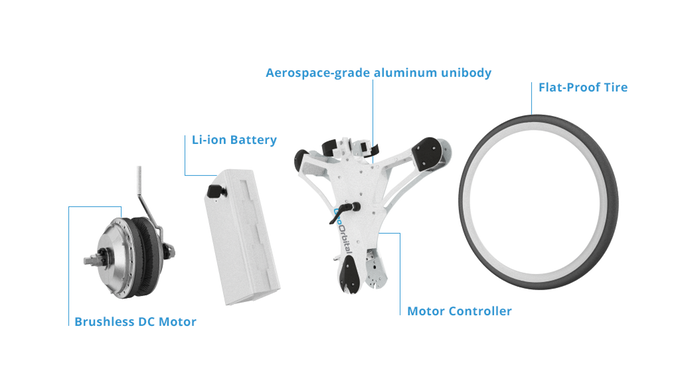Entrepreneurs are generally told not to reinvent the wheel. And you probably shouldn’t, unless the wheel you have in mind transforms regular bicycles into powerful electric bikes in a minute flat. That’s exactly what the GeoOrbital Wheel does, and it pulls off the feat with style points, thanks to a design inspired by the high-tech transportation in the movie Tron.
Adding an electric powertrain to bicycles isn’t an unheard-of capability. There are a number of aftermarket add-ons involving battery packs and motors that can be retrofitted to channel electric power to the wheels of standard bicycles. However, none of these accessories rival the simplicity of the GeoOrbital Wheel.
The modular wheel can be fixed in place of the front wheel in any bike – no tools being required to complete the installation. And it’s a one-size-fits-all solution in the best way possible; the design has been tested on hundreds of of bikes across styles and eras, and found to be perfectly functional in all cases.
The only component of the system that isn’t housed within the body of the wheel is the throttle, which goes on the handlebar, as you’d expect. There’s a power button on it and lights to signal how much juice remains in the wheel’s battery.
There are two sizes in which the wheel is produced: a 26-incher, and a 700C, which should also be compatible with bikes that have 28- and 29-inch wheels. The foam tires the GeoOrbital uses are flat-proof, so getting a flat or even checking tire pressure isn’t something you have to worry about.

At the centre of the GeoOrbital Wheel’s design is a 500W brushless DC motor, which draws power from a 36V Panasonic lithium-Ion battery. The battery lasts 12 miles if used exclusively; it can be sustained up to 30 miles if riders supplement the electric power with pedaling. The higher range in the latter case is because the wheel has a regeneration mechanism; pedaling, slowing down, going downhill – any motion of the bike that doesn’t draw power from the battery – will result in electric power being regenerated in small amounts each time.
The motor and battery combine to produce a top speed of 20mph – not exactly breakneck pace, but sufficient for city use. Output from the battery can also be used to (obviously) charge a phone using a built-in USB outlet, or even to power lights for bike rides in the night.
It may not make for the fastest makeshift electric bikes in the world, but there seems to be a great deal of demand for the GeoOrbital Wheel nonetheless. The KickStarter campaign has raced well past its $75,000 goal by raising over $300,000 with over a month to go. The Super Early Bird and Early Bird pledges are all gone, so the least you can get the wheel for now is $699, which is still 27% off its eventual $950 retail price.


